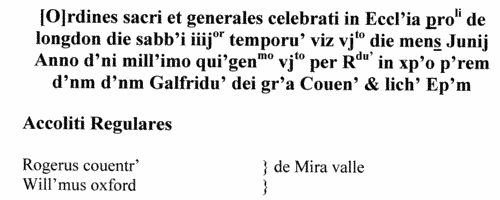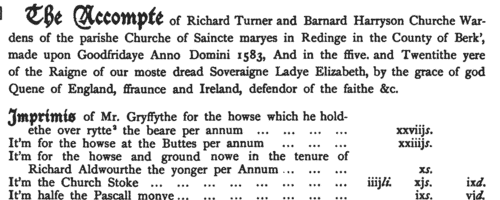Bureton Surname Ancestry ResultsOur indexes 1000-1999 include entries for the spelling 'bureton'. In the period you have requested, we have the following 7 records (displaying 1 to 7): Buy all | | | Get all 7 records to view, to save and print for £42.00 |
These sample scans are from the original record. You will get scans of the full pages or articles where the surname you searched for has been found. Your web browser may prevent the sample windows from opening; in this case please change your browser settings to allow pop-up windows from this site. Curia Regis Rolls
(1210-1212)
The Curia Regis, king's court, of mediaeval England took cases from throughout the country, and its records are among the most important surviving from this early period.BURETON. Cost: £4.00.  | Sample scan, click to enlarge

| Early records of Wells cathedral, in Somerset
(1001-1500)
Three early registers of the dean and chapter of Wells - the Liber Albus I (White Book; R I), Liber Albus II (R III), and Liber Ruber (Red Book; R II, section i) - were edited by W. H. B. Bird for the Historical Manuscripts Commissioners and published in 1907. These three books comprise, with some repetition, a cartulary of possessions of the cathedral, with grants of land dating back as early as the 8th century, well before the development of hereditary surnames in England; acts of the dean and chapter; and surveys of their estates, mostly in Somerset.BURETON. Cost: £6.00.  | Sample scan, click to enlarge

| Lichfield Diocese Ordinations: Subdeacons Secular
(1507)
The diocese of Coventry and Lichfield at this period included the whole of Cheshire, Staffordshire and Derbyshire; all Lancashire south of the Ribble; northern Shropshire (including Shrewsbury); and northern Warwickshire (including Birmingham and Coventry). Ordinations took place on the four Ember Saturdays in the year, and on certain other occasions; lists of ordinands to the degrees of acolyte, subdeacon, deacon and priest were preserved in the ordination registers, a distinction being made between those clerks who were 'regular', i. e., monks, friars, &c., and those who were 'secular', the main body of the clergy. All ordinands were celibate, and those regular, and the secular who obtained benefices, remained so, but only a minority of the secular ordinands ever obtained benefices, and most will doubtless have married later in life. No man might be ordained to subdeacon or higher without proving either that he was of independent means or that he was sponsored by an institution or a gentleman. Most entries in the register of such ordinations therefore have the words 'ad titulum' followed by the name of the religious house that was the sponsor. This is an important indication of the man's origins - boys whose families were monastic tenants, and who were educated by the monks, would naturally be sponsored by the abbey. Only men who were born and bred in the diocese could be ordained by the bishop, unless producing letters dimissory from the bishop of the diocese of their birth. These are the ordinations celebrated on Ember Saturday, 29 May 1507, by Thomas bishop of Panados (Pavados), suffragan of bishop Geoffrey Blythe, in Longdon prebendal church.BURETON. Cost: £8.00.  | Sample scan, click to enlarge

| Inhabitants of Reading in Berkshire
(1550-1667)
The borough of Reading in Berkshire comprised three ancient parishes - St Giles, St Lawrence and St Mary. The churchwardens' accounts of Reading St Mary from 1550 to 1667 were transcribed by Francis N. A. Garry and A. G. Garry and published in 1893. The accounts, usually signed off by the two churchwardens and two surveyors of the highways for the year, listed the income and expenditure of the church. Income included annual payments for seats in the pews; rents from church property; fees for the use of the pall and for tolling the knell (knill) at funerals, and for opening graves; and sums received for 'gatherings', i. e. money gathered from communicants at Easter, Hocktide, Mayday, Hallowmas, Christmas and Whit. Expenditure was largely on maintaining the church fabric, and paying the minor officials - most of the names found on this side of the account are of local workmen busy with repairs.BURETON. Cost: £4.00.  | Sample scan, click to enlarge

| Treasury Books
(1713)
Records of the Treasury administration in Britain, America and the colonies, for 1713. Also includes Queen Anne's Civil List (royal expenditure) Lottery papers: payment of the royal servants had fallen two years in arrear: Parliament passed an Act allowing the queen to raise half a million pounds by pledging 32 years' future income: she did this by means of a lottery.
BURETON. Cost: £4.00.  | Sample scan, click to enlarge

|  Merchant Seamen
(1835-1844) Merchant Seamen
(1835-1844)
At this period, the foreign trade of ships plying to and from the British isles involved about 150,000 men on 15,000 ships; and the coasting trade about a quarter as many more. A large proportion of the seamen on these ships were British subjects, and so liable to be pressed for service in the Royal Navy; but there was no general register by which to identify them, so in 1835 parliament passed a Merchant Seamen's Registration Bill. Under this act a large register of British seamen was compiled, based on ships' crew lists gathered in British and Irish ports, and passed up to the registry in London. A parliamentary committee decided that the system devised did not answer the original problem, and the original register was abandoned after less than two years: the system was then restarted in this form, with a systematic attempt to attribute the seamen's (ticket) numbers, and to record successive voyages. The register records the number assigned to each man; his name; age; birthplace; quality (S = seaman, &c.); and the name and official number of his ship, with the date of the crew list (usually at the end of a voyage). Most of the men recorded were born in the British Isles, but not all. The system was still very cumbersome, because the names were amassed merely under the first two letters of surname; an attempt was made to separate out namesakes by giving the first instance of a name (a), the second (b), and so on. In this volume the register is restarted from 1840 onwards, with the mariner's previous number (if any) being entered in the column after his birthplace. In the event of it becoming known that a man had died during the course of a voyage, that information is written across the remaining empty columns. This volume (BT 112/10) covers mariners whose surnames start with Bu and By (and McBu and McBy).BURETON. Cost: £8.00.  | Sample scan, click to enlarge

|  London Policemen
(1843-1857) London Policemen
(1843-1857)
The Metropolitan Police Register of Joiners (MEPO 4/334) lists policemen joining the force 1 January 1843 to 1 April 1857 (warrant numbers 19893 to 35804). The register is alphabetical, in so far as the recruits are listed chronologically grouped under first letter of surname. It gives Date of Appointment, Name, Number of Warrant, Cause of Removal from Force (resigned, dismissed, promoted or died), and Date of Removal. Although the register was closed for new entrants at the end of 1842, the details of removals were always recorded, some being twenty or more years later. Those recruits not formerly in the police, the army, or some government department, were required to provide (normally) at least two letters of recommendation from persons of standing, and details of these are entered on the facing pages: the names in these are indexed separately - this index refers only to the police constables. Where a recruit was only recently arrived in the metropolis, the names and addresses of the recommenders can be invaluable for tracing where he came from.BURETON. Cost: £8.00.  | Sample scan, click to enlarge

|
Research your ancestry, family history, genealogy and one-name study by direct access to original records and archives indexed by surname.
|










